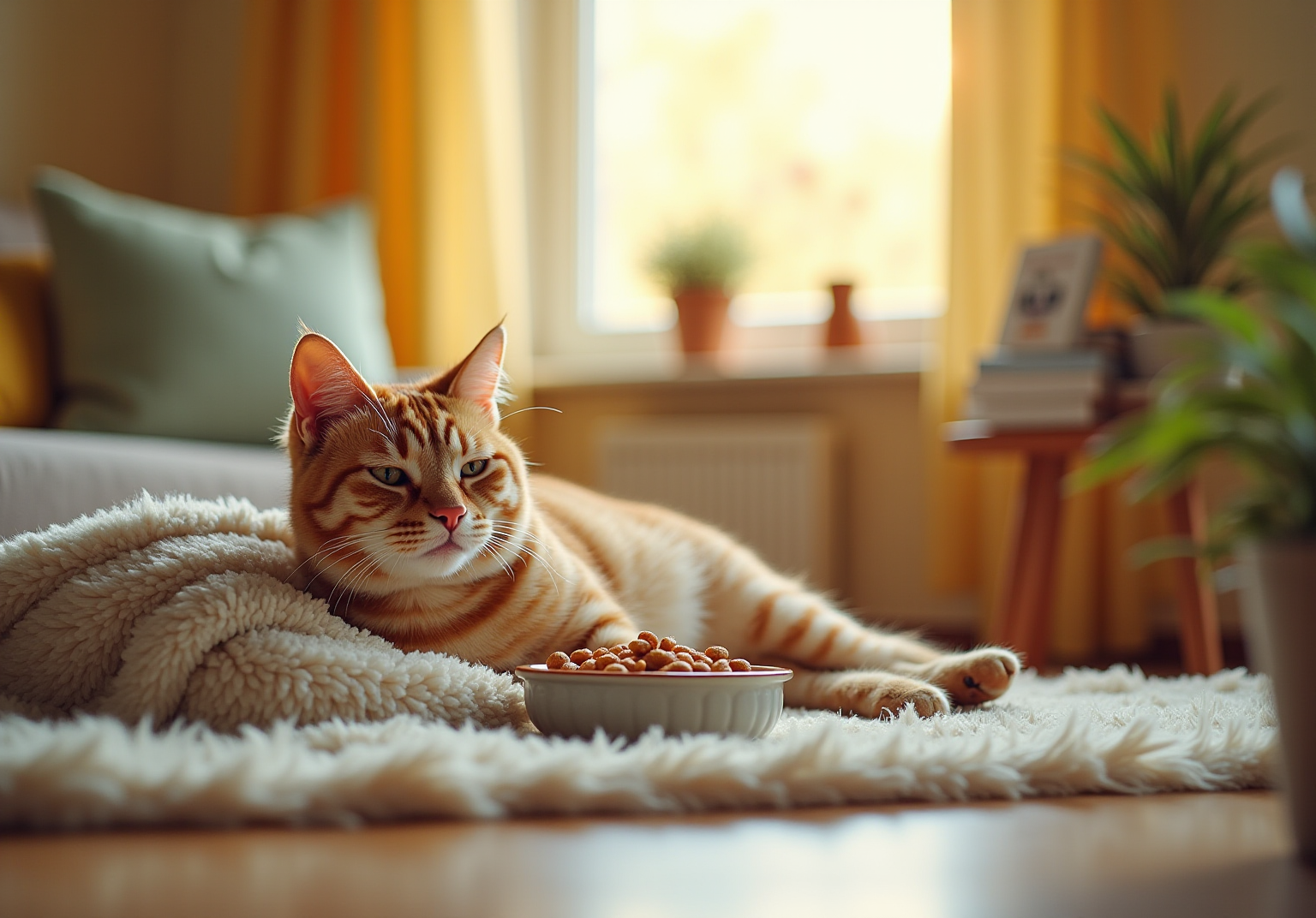What is an Appetite Stimulant for Cats and Why It Matters
Overview
Appetite stimulants for cats are vital medications or substances that help increase their desire to eat. This is especially important for your furry family members who may be experiencing a lack of appetite due to health issues, anxiety, or the natural effects of aging. At Adventure Den, we understand how concerning it can be to see your beloved pet struggle with eating.
Medications like mirtazapine and capromorelin play a crucial role in preventing malnutrition and dehydration. These conditions can lead to serious health complications in our feline friends, making it essential to address their appetite needs promptly. By utilizing these stimulants, we can help ensure that your pet remains healthy and vibrant.
We encourage you to consider the benefits of appetite stimulants as a part of your cat’s care plan. Remember, a well-nourished pet is a happy pet, and we are here to support you in creating a nurturing environment for your beloved companion. If you have any concerns or questions about your cat’s appetite, please reach out to us at Adventure Den—we’re here to help you every step of the way.
Introduction
Appetite loss in our furry family members can be a distressing experience for pet owners, often signaling underlying health issues that deserve immediate attention. Understanding appetite stimulants for cats is essential, as these medications can significantly enhance a feline’s desire to eat, helping to prevent serious health complications such as malnutrition and dehydration.
With various options available—from prescription medications to natural remedies—how can you determine the best approach for your beloved companion? Exploring the world of appetite stimulants not only highlights their importance in feline health but also reveals the complexities surrounding their use and effectiveness. Your pet’s well-being is our priority, and we’re here to guide you through this journey.
Defining Appetite Stimulants for Cats
Appetite stimulants for cats are medications or substances designed to increase their desire to eat. These can be vital for felines who are experiencing a lack of appetite due to various health issues, anxiety, or changes in their environment, and an appetite stimulant for cats may help address this issue. Common hunger stimulants include:
- Mirtazapine
- Capromorelin
- Cyproheptadine
Each works in unique ways to encourage food intake.
For example, mirtazapine is a tricyclic antidepressant that influences serotonin receptors in the brain, promoting increased food consumption. Recent studies have shown the effectiveness of mirtazapine in helping felines undergoing chemotherapy, with about 60% of these pets displaying improvements in body weight after treatment. Furthermore, felines with chronic kidney disease (CKD) experienced a median weight increase of 0.18 kg during mirtazapine treatment, with a range from 0 to 0.45 kg. However, it’s essential to be aware that 20% of felines may experience adverse effects from mirtazapine, highlighting the importance of careful monitoring.
Capromorelin, which is approved for use in felines with CKD, stimulates appetite by increasing growth hormone levels. The FDA has noted that weight loss is a common concern among felines with various illnesses, and tackling this issue can be challenging. These insights underscore the significance of using an appetite stimulant for cats in veterinary medicine, providing crucial support for felines struggling to maintain their nutritional intake. By understanding and addressing these needs, we can create a nurturing environment for your beloved pets.
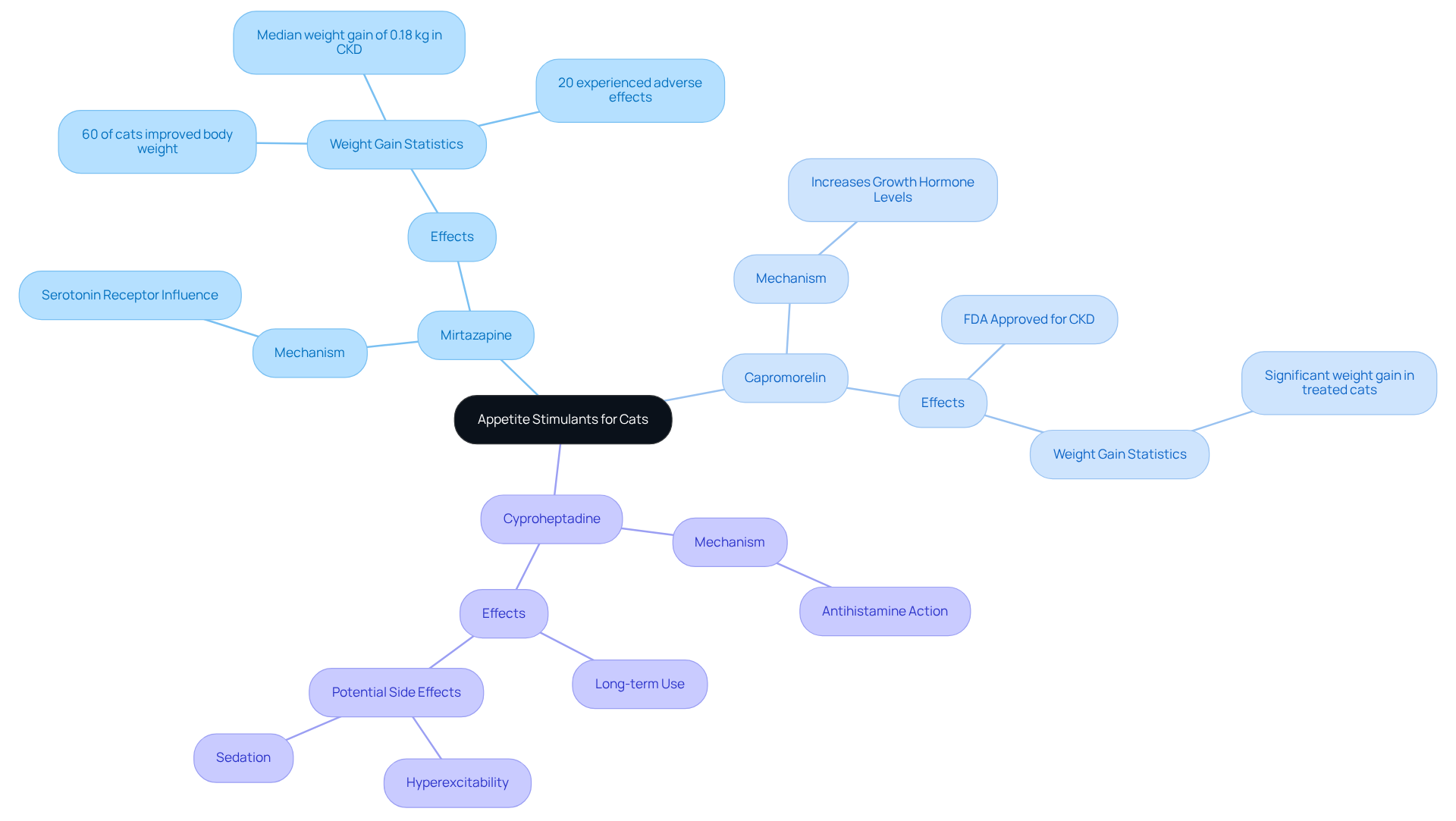
The Importance of Appetite Stimulants in Feline Health
An appetite stimulant for cats plays a vital role in the wellness management of our furry family members, especially for those that may be experiencing decreased food intake due to sickness, anxiety, or the natural aging process. A prolonged lack of appetite can lead to serious complications, such as hepatic lipidosis, malnutrition, and dehydration. As veterinarian Molly Price wisely points out, “Since not consuming food for 24-36 hours can lead to serious medical issues in a cat, an eating aid can be a crucial medication.” This statement highlights the urgency of timely intervention.
Appetite stimulants for cats are essential in ensuring that they receive the necessary nutrients to recover from illness or maintain their overall health. In cases of chronic kidney disease, where a loss of appetite is common, medications like mirtazapine and capromorelin (Elura) act as an appetite stimulant for cats, showing remarkable effectiveness in boosting hunger and enhancing the quality of life for our beloved pets. Veterinary specialists emphasize that addressing the loss of appetite swiftly with an appetite stimulant for cats can lead to improved recovery outcomes, underscoring the significance of these medications in feline healthcare.
Real-life experiences illustrate how cats recovering from illness often benefit from hunger enhancers, which can be crucial in urgent situations. It’s also important to recognize that a loss of interest in food can be quite common among cats, influenced by various factors such as illness and stress. Understanding the importance of an appetite stimulant for cats is essential for both pet owners and veterinarians, as they are key to overseeing the health and well-being of our cherished feline companions. By ensuring our pets receive the care they need, we can create a nurturing environment that supports their recovery and happiness.
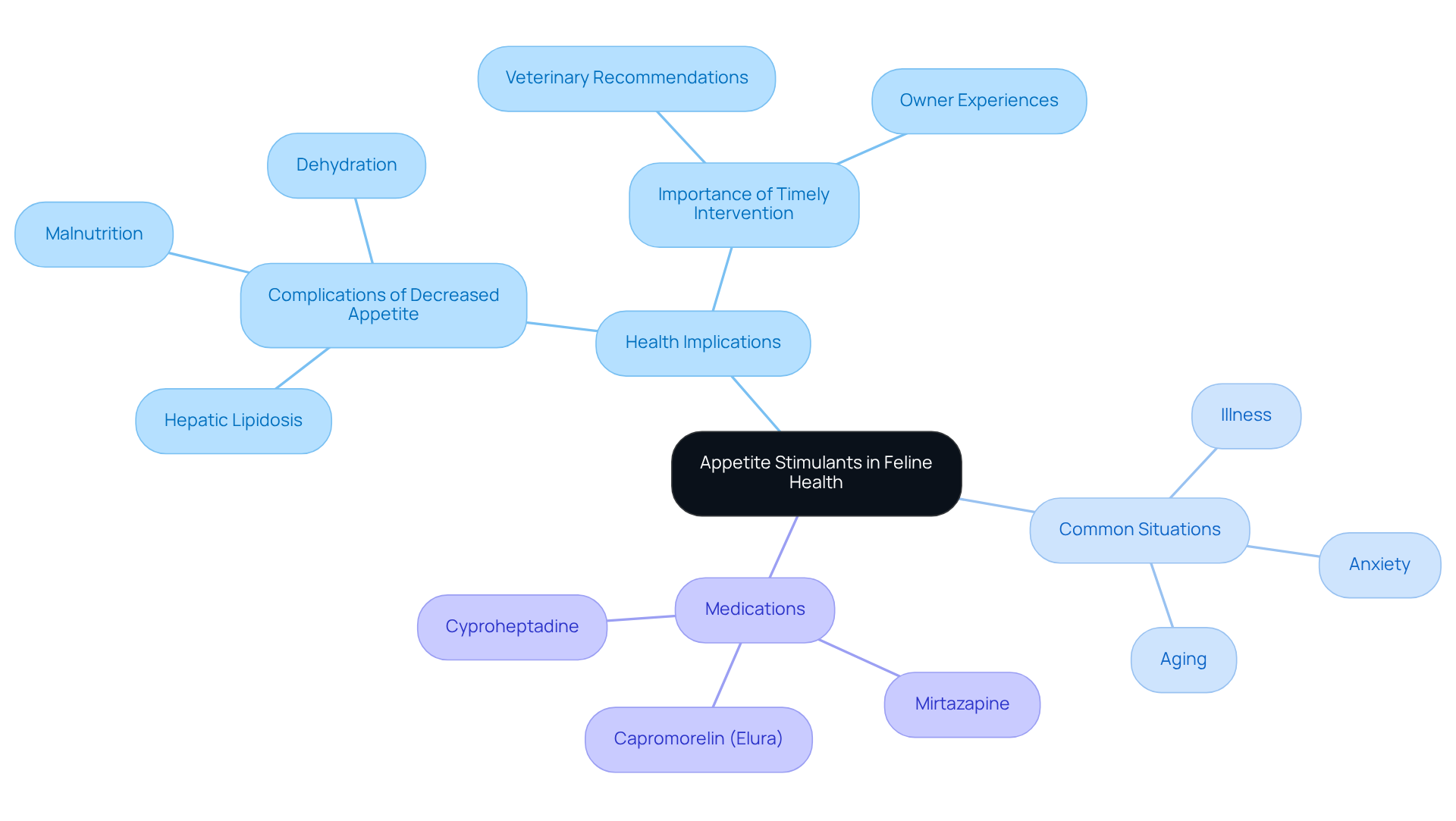
Types of Appetite Stimulants: Prescription vs. Natural Options
Understanding your furry family members’ appetite can be a heartfelt concern, especially when they face health challenges. Appetite enhancers can be classified into two main categories: prescription medications and natural alternatives. Veterinarians often suggest prescription appetite stimulants for cats, such as mirtazapine and capromorelin, due to their proven effectiveness in boosting appetite in those experiencing specific health issues.
For instance, mirtazapine is FDA-approved and widely used for cats undergoing unintended weight loss, with studies showing that 91% of those treated gained weight and 71% had improved body condition scores. Capromorelin, another prescription option, mimics ghrelin, the body’s appetite-boosting hormone, and has shown significant results in increasing food intake among cats with chronic conditions.
On the other hand, natural hunger stimulants may include herbs like catnip, flavor enhancers, or techniques like warming food to enhance its aroma and appeal. While these natural methods can be beneficial, they often lack the potency of prescription medications, particularly in serious cases of appetite loss. For example, warming food can make it more enticing, but it may not be enough for a cat with underlying health issues. Therefore, consulting with a veterinarian is essential to determine the most effective approach tailored to your cat’s individual needs.
Recent advancements in hunger stimulants have also highlighted the importance of understanding the pharmacokinetics of these medications. For example, mirtazapine’s half-life varies significantly in cats with chronic kidney disease, necessitating careful dosing adjustments. Experts emphasize that while natural alternatives can complement treatment, prescribed medications are still crucial as an appetite stimulant for cats facing serious health challenges. Additionally, potential side effects of mirtazapine, such as vocalization and agitation, should be considered when discussing treatment options with your veterinarian. Together, we can ensure your beloved pet receives the best care possible.
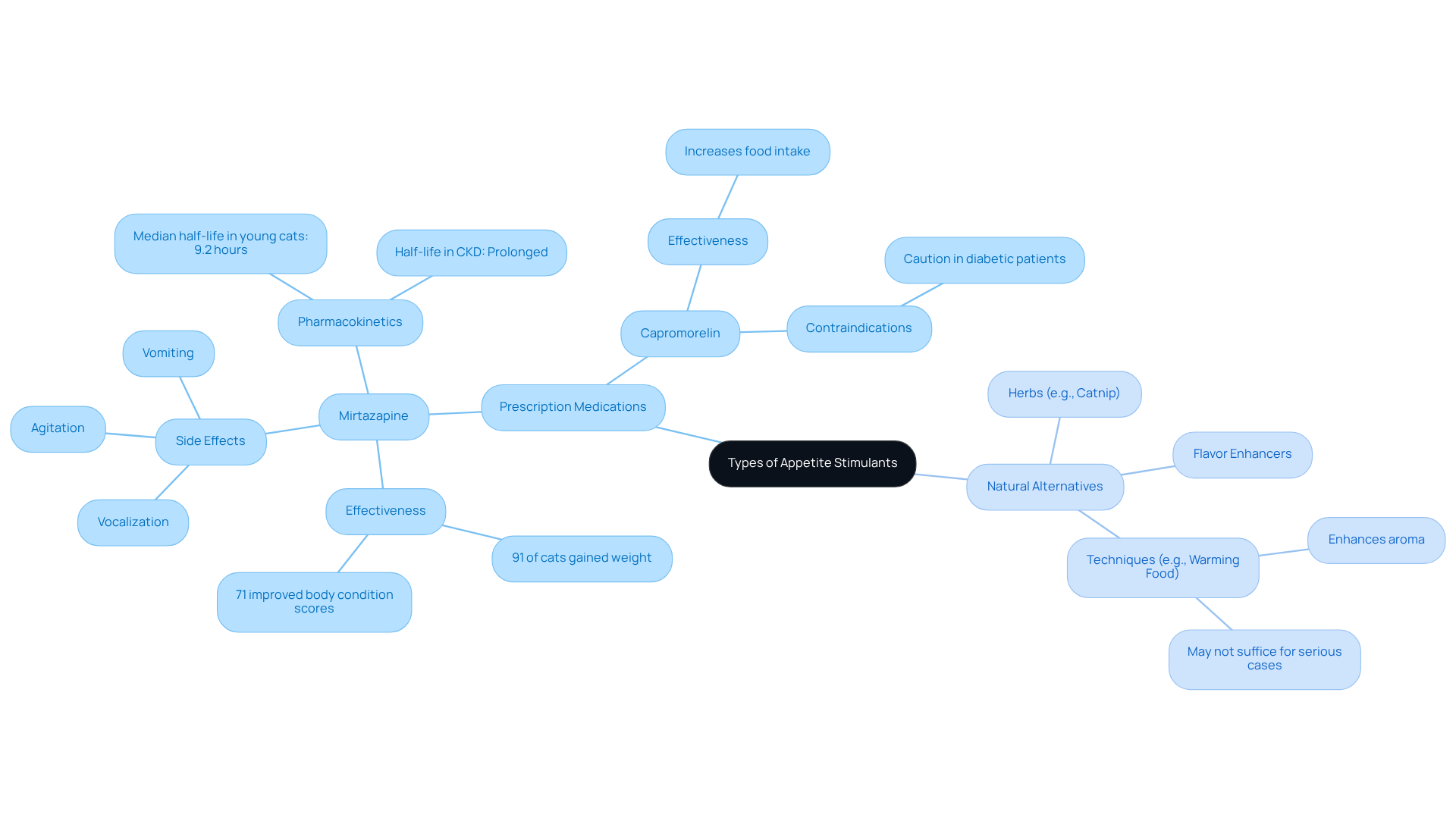
Benefits of Appetite Stimulants for Cats
The advantages of an appetite stimulant for cats for your furry family members are both numerous and significant. Firstly, these medications can act as an appetite stimulant for cats, helping to prevent malnutrition and dehydration—critical concerns for those that refuse to eat. They encourage regular food intake by using an appetite stimulant for cats, which is essential for maintaining energy levels and overall health. For instance, research has shown that in a double-blind trial, 91% of felines treated with mirtazapine, involving 21 subjects, gained weight compared to those on placebo, where 82% of felines lost weight. This is especially crucial for cats recovering from surgery or illness, as adequate nutrition during these vulnerable times can greatly influence recovery outcomes.
Moreover, food enhancers can enhance a cat’s quality of life, making them more lively and engaged. In clinical settings, veterinary perspectives reveal that the use of hunger enhancers not only aids in nutritional consumption but also contributes to better wellness measures, including hydration and energy levels. For example, in a study involving felines with chronic kidney disease (CKD), those receiving stimulation for their desire to eat exhibited improved overall well-being and recovery rates. However, it is important to be aware that mirtazapine may have side effects, such as vocalization and vomiting, which should be closely monitored. Therefore, incorporating an appetite stimulant for cats into a comprehensive health care plan is vital for ensuring that they receive the necessary nutrition to thrive.
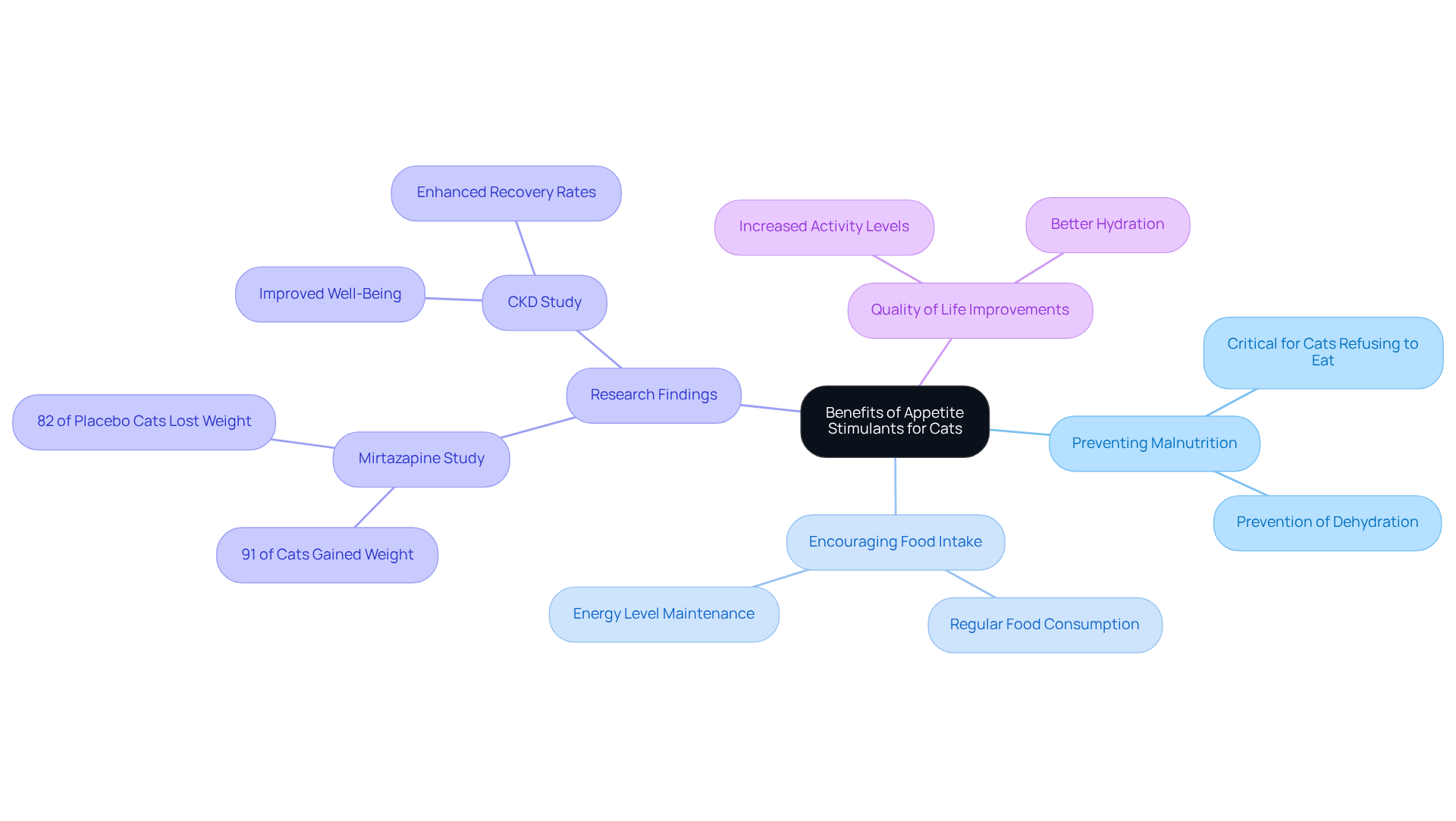
Conclusion
Appetite stimulants for cats play a vital role in addressing the heartfelt challenges faced by our feline friends who struggle with a lack of appetite due to various health issues. These specialized medications, such as mirtazapine and capromorelin, are essential in ensuring that cats receive the necessary nutrients to maintain their health and recover from illnesses. By recognizing the importance of these stimulants, pet owners can take proactive steps to support their furry family members during difficult times.
This article highlights several key points, including:
- The effectiveness of prescription appetite stimulants in combating weight loss and malnutrition, particularly in cats with chronic conditions like kidney disease.
- The potential benefits of natural alternatives, while underscoring the necessity of veterinary guidance to tailor the approach to each cat’s unique needs.
- The urgency of addressing appetite loss is reinforced by the risks of severe health complications that can arise from prolonged periods without food.
Ultimately, understanding the significance of appetite stimulants in feline health is essential for enhancing the well-being of our beloved pets. By ensuring timely intervention and appropriate treatment options, pet owners can create a nurturing environment that promotes recovery and happiness. Taking action to understand and implement these measures can make a meaningful difference in the lives of cats facing appetite challenges, ensuring they thrive in both health and spirit.
Frequently Asked Questions
What are appetite stimulants for cats?
Appetite stimulants for cats are medications or substances designed to increase their desire to eat, which can be vital for felines experiencing a lack of appetite due to health issues, anxiety, or environmental changes.
What are some common appetite stimulants for cats?
Common appetite stimulants for cats include mirtazapine, capromorelin, and cyproheptadine.
How does mirtazapine work as an appetite stimulant?
Mirtazapine is a tricyclic antidepressant that influences serotonin receptors in the brain, promoting increased food consumption.
What are the effects of mirtazapine on cats undergoing chemotherapy?
Recent studies have shown that about 60% of cats undergoing chemotherapy display improvements in body weight after treatment with mirtazapine.
What weight changes can be expected in cats with chronic kidney disease (CKD) when treated with mirtazapine?
Felines with chronic kidney disease (CKD) experienced a median weight increase of 0.18 kg during mirtazapine treatment, with a range from 0 to 0.45 kg.
Are there any side effects associated with mirtazapine?
Yes, approximately 20% of felines may experience adverse effects from mirtazapine, highlighting the importance of careful monitoring during treatment.
How does capromorelin function as an appetite stimulant?
Capromorelin stimulates appetite by increasing growth hormone levels and is approved for use in felines with chronic kidney disease (CKD).
Why is addressing appetite loss in cats important?
Weight loss is a common concern among felines with various illnesses, and tackling this issue can be challenging. Using appetite stimulants provides crucial support for felines struggling to maintain their nutritional intake.

